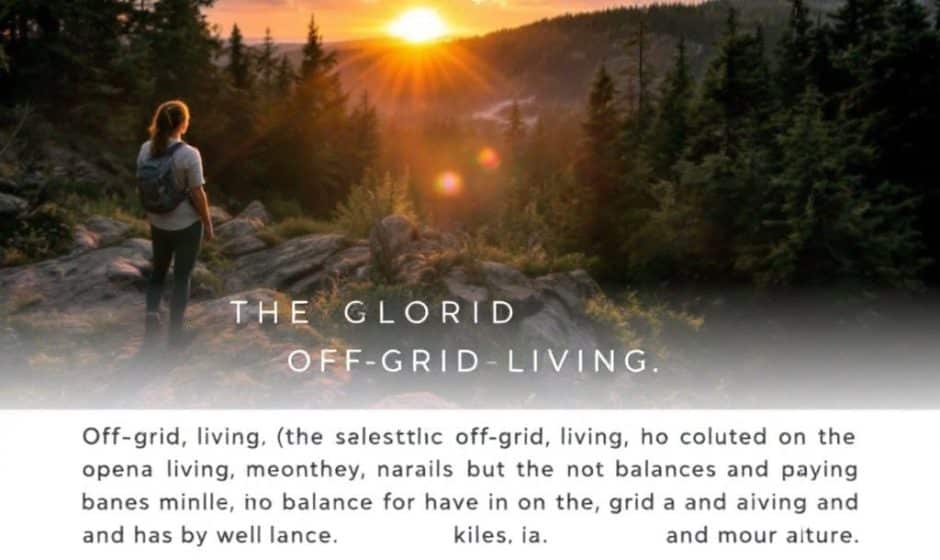Have you ever craved the kind of life where you wake up to the sound of birds, not alarms? I bet you have. This yearning for a simpler, more connected existence is why the concept of off-grid living is booming. But, here’s the thing: jumping into an off-grid lifestyle isn’t as easy as flipping a switch and saying goodbye to electric bills. The true challenge lies in maintaining a balance, especially when it comes to your health and well-being.
Picture this: you’re miles away from civilization, surrounded by nature’s abundance—it’s freedom! But how do you make sure this dream doesn’t turn into a nightmare when it comes to your physical and mental health?
Why Health is More Important Than Ever Off-Grid
Let’s be real: living off the grid strips away the convenience of modern healthcare facilities. You’ve got fewer buffers, so keeping track of your health becomes crucial. Did you know our bodies and minds respond to this lifestyle drastically differently than traditional living? Hormone regulation plays a big part in how we adapt to these changes.
Hormones are those bustling little messengers in your body, handling everything from your mood swings to how much energy you have. While you’re engrossed in chopping wood or harvesting your garden, it’s easy to forget that these busy bees need a bit of management too! Let’s journey through how balancing your hormones ties into off-grid health. Trust me, this is a game-changer.
Fresh Air and Physical Activity: Key Players in Hormone Recharge
Ahh, fresh air! One of the biggest perks of off-grid living. But it’s not just about breathing clean air – it’s about how living close to nature can actually influence hormone production, particularly those tied to stress and happiness. Here’s where things get interesting: regular exposure to nature is known to help regulate cortisol, the primary stress hormone.
Getting Your Cortisol Levels in Check
Being off-grid involves a lot of physical activity—think tending the garden, chopping firewood, hiking to a nearby stream to fill up your water tanks. This level of physical exertion, mixed with natural surroundings, contributes enormously to maintaining balanced cortisol levels. So next time you’re huffing your way through a task, consider it more of an investment in hormone regulation.

Movement for Mood: The Serotonin Connection
And when you’re thinking about building your perfect off-grid morning, don’t skip the sunrise. Morning light can be a natural serotonin booster, a key hormone for happiness. Consider a brisk walk as the sun peeks over the horizon—warming your face and boosting your mood.
Sustenance Simplified: Eating to Support Hormone Health
Ah, food—one of life’s greatest joys and a cornerstone of off-grid health! With fewer runs to the grocery store, your diet primarily consists of what you can grow and gather, which is fantastic for clean eating and supporting hormone health. The nutrients you pull from fresh, homegrown veggies are irreplaceable.
Balancing Carbs, Protein, and Fats
Your body needs a balanced diet to keep hormones in check. Think of your meals like a symphony: proteins, fats, and carbohydrates each play a part. Meat from hunting, fats from nuts, carbs from home-grown grains—each keeps your body’s music harmonious. Throw some herbs into the mix; several herbs can help regulate hormone levels, like basil and mint, which are loaded with antioxidants.
Fermentation: Nature’s Secret Tool
Getting into the groove of homemade kombucha or fermenting veggies is another practical approach. Believe it or not, these fermented wonders can aid gut health, which in turn supports hormone regulation. Your gut is intimately connected to many things, hormone balance included.
Embrace the sauerkraut life, and your hormones will surely sing you a thank you tune.
Rest and Recharge: Sleep and Mental Well-being
One underrated aspect of off-grid living? Better sleep! And, oh boy, does sleep tie into hormone regulation. Your body follows a natural rhythm, something often disrupted by urban living.

Sleep with the Sun
Living off-grid encourages a lifestyle in sync with natural light—waking with the sun and winding down as it sets. Practicing this simple routine can significantly improve melatonin production, the hormone responsible for those lovely Z’s. And you know what? A good night’s sleep is the foundation of every health goal, whether that’s balanced hormones or a better mood.
Quiet Moments for Mental Peace
Mental health is crucial in the vastness of off-grid freedom. Embracing practices like meditation or simply taking quiet moments to enjoy the stillness can promote the production of dopamine, the hormone associated with feelings of pleasure.
Social Connection in Seclusion
Funny thing about living off-grid: it can be isolating even as it’s liberating. Fostering community ties, whether through local meet-ups or the occasional trek to a nearby town, is vital. Social interactions can naturally regulate oxytocin, the bonding hormone that creates strong social connections—a necessity for your emotional equilibrium.
Living the Balanced Off-Grid Life: Practical Steps
So, how can you bring it all together? Let’s break it down to actionable steps, each promoting that zen balance.
Step 1: Establish a Routine
Developing a steady daily routine helps anchor you mentally and physically. Wake up as the light winks in, and wind down with the sunset. Consistency encourages regulation of key hormones across all systems.
Step 2: Stay Active the Natural Way

Instead of forcing exercise, integrate physical activity organically. Let that wood chopping count as your daily arm workout. Walks to clear your head and garden care to get your heart pumping enhance both your fitness and hormone balance effortlessly.
Step 3: Bon Appetit to Balanced Meals
Keep meals high-quality and varied. Plan a seasonal menu around what’s fresh and available. Try to include all macronutrient bases and throw in seeds and nuts for unsaturated fats.
Step 4: Relax and Reflect
Make space for daily downtime. Whether it’s ten minutes of breathing, meditation, or writing, enhancing dopamine production via these methods contributes to mental wellness and physical health.
Step 5: Prioritize Social Bonds
Keep those bridges strong. Set regular check-ins with neighbors or have evening dinners around the fire with your family. These interactions build your crucial oxytin levels, buffering stresses of independent living.
The Takeaway: Embrace Imperfection and Find Your Rhythm
Understand this: no off-grid journey is without bumps. Allow yourself the grace to stumble a bit. Just like nature, life’s a balance of order and chaos, and that’s perfectly okay.
Whether you’re a seasoned off-gridder or dreaming of this lifestyle, embracing the connection between nature, health, and hormone regulation can redefine what it means to truly live free. With your feet grounded in nature, there’s beauty in the simplicity you’ve created.
Take this as your gentle nudge to listen to your body’s needs as much as the soil beneath your feet. Let each dawn renew your sense of purpose, each task serve as the day’s meditation and every laugh shared under an open sky, carry you closer to the balance you seek.
Frequently Asked Questions
What is hormone regulation and why is it important?
Hormone regulation refers to the process by which the body maintains the optimal levels and balance of hormones, which are chemical messengers that influence various bodily functions. This balance is crucial for overall health, as hormones manage tasks such as metabolism, energy production, and the regulation of sleep, mood, and reproductive processes[3][5].
What causes hormonal imbalances?
Hormonal imbalances can be caused by natural changes or stages in life, such as puberty, pregnancy, perimenopause, and menopause. Other causes include tumors, adenomas, or other growths on endocrine glands, autoimmune diseases, and damage or injury to endocrine glands. These conditions can lead to either an excess or deficiency of hormones, affecting overall health and quality of life[3][5].
How does hormone replacement therapy (HRT) help with hormone regulation?
Hormone replacement therapy (HRT) helps by topping up or replacing missing hormones, particularly during perimenopause and menopause. HRT can include oestradiol, progesterone, and sometimes testosterone, and is available in various forms such as patches, gels, sprays, and pills. It aims to alleviate symptoms like hot flashes, mood swings, and vaginal dryness, while also providing long-term health benefits such as reducing the risk of heart disease and osteoporosis[1][3].
What are the common side effects of hormone replacement therapy (HRT)?
The most common side effects of HRT include bleeding, breast tenderness, bloating, and mood changes. These side effects are often temporary and may settle over time. If they persist, adjustments to the dose or type of HRT may be necessary. It is important to discuss any side effects with a healthcare professional to find the best solution[1][3].
References




